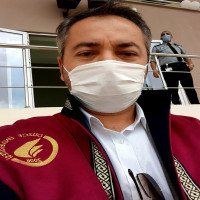Research Article
Issue Reviewers



 Web
Web
Field Editor (Faculty of Economics and Administrative Sciences)



Gazi Üniversitesi İstatistik Ana Dal (bölüm derecesi), Ekonometri Çift Ana Dal mezunudur (2013). Marmara Üniversitesi İstatistik Bilim Dalı Yüksek Lisans, Dokuz Eylül Üniversitesi Ekonometri Ana Bilim Dalı Doktora mezunudur. Tez çalışmalarını Büyük Veri ve Makine Öğrenmesi üzerine yapmıştır. Bu alanlarda çalışmalarına devam etmekte ve Manisa Celal Bayar Üniversitesi Ekonometri Bölümü İstatistik Ana Bilim Dalı'nda Dr. Öğretim Üyesi olarak görev yapmaktadır. Aynı zamanda İstatistik, Büyük Veri Yönetimi, Araştırma Yöntemleri derslerini yürütmektedir.




A committed and knowledgeable Lecturer educated to PHD level and extensively published in theoretical and experimental works, with significant expertise in IE, Health and Safety analysis. With over 15+years of experience at a leading Istanbul Rumeli University institution, teaching students from various social and cultural backgrounds with a focus on Industrial Engineer search practice. https://www.linkedin.com/in/asst-prof-dr-haldun-turan-14a412229/
Disciplines
Business AdministrationOrganizational StudiesSupply chain managementIndustrial EngineeringManufacturing Engineering
Skills and expertise
Analytic Hierarchy ProcessLeadershipDecision AnalysisStrategic PlanningManagementBusinessStrategic ManagementLogisticsBusiness Analysis



Aim & Scope
Journal of Applied Sciences of Mehmet Akif Ersoy University is an international refereed journal. It aims to contribute to applied social sciences and humanities by publishing studies in accordance with scientific qualifications to readers and the science world.
Journal of Applied Sciences of Mehmet Akif Ersoy University includes scientific studies in accordance with original and academic literature related to a field of social sciences such as economics, business, marketing, accounting, finance, international trade, international relations, public administration and humanities.
Author Guidelines
Author Guidelines
Journal Publishing Principles
- The studies submitted to the journal should be scientific and original.
- The studies which are presented in scientific activities which congress, symposium etc. but not published can be published in the journal provided that they are mentioned.
- Studies should not have been previously published elsewhere and have not been sent elsewhere for publication.
- The academic title, author names, institutions and e-mail information in the articles should be indicated on a separate page at the beginning of the study.
- It should be taken care not to exceed the entire article to 10,000 words.
- Submission and acceptance dates of the article published in the journal are shown in the first page of the article.
Journal Publication Process and Rules
- Scientific studies submitted for publication in the journal are examined by the editor and / or editorial board in accordance with the principles and writing rules of the journal.
- Original studies in accordance with the principles and writing rules of the journal are sent to at least two reviewers from the arbitration board in line with the principles of blind-review.
- If the approval of evaluate the article does not come from reviewer within 15 days, the study sent to another reviewer.
- In addition, if the evaluation report does not come from reviewer for evaluation within 1 month, the study sent to another reviewer for evaluation.
- In accordance with the decisions of the reviewers, original works are published or rejected.
- Studies that do not comply with the publication principles and writing rules of the journal are sent back to the authors of the study to make corrections.
- No fee is paid for the studies published in the journal, and the author / authors whose studies is published is not paid any fee.
- In addition, the author / authors acknowledge that all publication rights of the studies submitted to the journal belong to the Journal of Applied Sciences of Mehmet Akif Ersoy University.
- Scientific and legal responsibility of the studies published in the journal belongs to the authors of the studies.
Article Submission
- Article submission should only be uploaded to the journal's web page through the internet.
- All proceedings after the article submission should be followed by the authors through the journal web page. All revisions and changes of the article will be made through the journal web page.
- The article will be automatically rejected if the requested revisions and changes do not made within 1 month.
Writing Rules
- All articles should be written using the Microsoft Word software program, with a margin of 2.5 cm from each edge in A4 size (210 x 297 mm).
- Typeface should be Times New Roman and all sections should be 12 type size, 1.5 lines apart, justified. Indent should be the first row and 1.25.
- Articles should not have a page number.
- The Turkish and English titles of the articles should be written in initial letters large, bold, centered on page and Times New Roman 14 font size. Turkish and English titles should not exceed 16 words.
- English studies should include a Turkish abstract and Turkish studies should include an English abstract. The abstract should not exceed 250 words and should be justified. Under abstract titles should contain a keywords that does not exceed 5 words.
- All sections should be numbered starting from the introduction section. Numbering should be 1., 1.1. 1.2, 1.3. and should not be more than 3 subheadings.
- When requerid, tables and figures should be reduced to 8 font size and fit in one page. Tables and figures that do not fit in one page should be shown at the end of the studies.
- References of tables and figures should be given in under the tables and figures. Numbers of tables and figures should be arranged in a sequential manner and numbers should be placed in above the tables and below figures.
- In-text citation in the article should be as follows:
- According to Karakaya (2014)…
- As Kushilevitz and Malkin (2016) stated in their study...
- Solmaz et al. (2013) for…
- In the work of Figley (2002) and O'Halloran and Linton (2000)…
- ……….( Kushilevitz & Malkin, 2016).
- ……….(Elwood et al., 2011; Figley, 2002; O’Halloran & Linton, 2000).
- In cases where page number is required;
- As Kushilevitz and Malkin (2016, p.24) stated in their study...
- Solmaz et al. (2013, pp.24-32) stated in their study
- ……….(Karakaya, 2014, p.14).
- ……….(Solmaz et al., 2013, pp.23-24).
- The in-text references of abbreviations should be as follows:
First reference; - Turkish Statistical Institute (TUIK, 2020)….
- …………(Turkish Statistical Institute [TUIK], 2020).
The next references are; - In the TUIK (2020) unemployment report….
- …………(TUIK, 2020).
- References should be listed ''References'' title without alphabetical numbering after the result section. If there is a Doi number of the reference, Doi number of the reference should be included in the ''References''. Typeface and type size of references should be Times New Roman 10 font size and justified.
REFERENCES
For the book with single author:
· Jolliffe, I. T. (1986). Principal component analysis. New York: Springer.
For the book with two or more author:
· George, D. & Mallery, P. (2003). SPSS for windows, step by step, a simple guide and reference. Boston: Allyn and Bacon.
For the book with single author and editor:
· Hallinan, M. T. (Ed.) (2005). Handbook of the sociology of education. New York: Springer.
For the book with two or more author and editors:
· Gibbs, J.T. & Huang, L.N. (Eds.). (1991). Children of color: psychological intervention. San Francisco: Jossey-Bass.
If section taken from edited book:
· McKenzie, H., Boughton, M., Hayes, L. & Forsyth, S. (2008). Explaining the complexities and value of nursing practice and knowledge. In I. Morley & M. Crouch (Eds.), Knowledge as value: Illumination through critical prisms (pp. 209-224). Amsterdam, Netherlands: Rodopi.
For translation books:
· Gaerder, J. (1994). Sophie's world: A nobel about the history of philosophy (P. Moller, Trans.). London, United Kingdom: Phoenix House.
For article in a compiled book:
· Karasu, B. (1997). İmge üretiminde roman hâlâ ilk sırada. Ne kitapsız ne kedisiz (ss. 13-22). İstanbul: Metis.
For e-book:
· McLaney, E. (2009). Business Finance. Retrieved from: 25.04.2017, http://www.books.mec.biz/tmp/books/E58R5U5EUTFE1SF8SBF3ZSBVUI16N6.pdf..
For article with single author:
· Ajzen, I. (1991). The theory of planned behavior. Organizational Behavior and Human Decision Processes, 50(2), 179-211.
For article with two or more authors:
· Sharma, S., Shimp, T. A. & Shin, J. (1994). Consumer ethnocentrism: A test of antecedents and moderators. Journal of the Academy of Marketing Science, 23(1), 26-37.
For electronic articles:
· Von Ledebur, S. C. (2007). Optimizing knowledge transfer by new employees in companies. Knowledge Management Research & Practice. 5(4), 229-236. doi: 1 0.1 057/palgrave.kmrp.8500141
For newspaper article:
· Schwartz, J. (1993, Eylül 30). Obesity affects economic, social status. The Washington Post, p. A1, A4.
· Brody, J. E. (2007, Eylül 11). Mental reserves keep brain agile. The New York Times. Retrieved from: 11.09.2007, http://www.nytimes.com
For the references with unknown authors:
· Smartphones are Common in Europe, U.S., Less so in Developing Countries. (2016). Retrieved from: http://www.pewresearch.org/fact-tank/2017/06/28/10-facts-about-smartphones/ft_17-06-28_smartphone_map/
For revised or expanded prints:
· Passer, M. W. & Smith, R. E. (2015). Psychology: The science of mind behaviour (2nd. Ed.). North Ryde, NSW: McGraw-Hill Education.
For unpublished thesis:
· Duddle, M. (2009). Intraprofessional relations in nursing: A case study (Unpublished doctoral thesis). University of Sydney, Austraila.
For internet sources:
· Simon, J., Smith, K. & West, T. (2009). Price incentives and consumer payment behaviour. Retrieved from: http://www.rba.gov.au/ PublicationsAndResearch/RDP/RDP2009-04.html
For multiple hardcover studies:
· Pflanze, O. (1963-1990). Bismarc and the development of Germany (Hardcover 1-3). Princeton, NJ: Princeton University Press.
For encyclopedia:
· Keyormarsi, K., O'Leary, N. & Pardee, A. B. (2007). Cell division. In McGraw-Hill encyclopedia of science technology (pp. 618-621). New York: McGraw-Hill.
For reports and technical articles:
· Gencel Bek, M. (1998). Mediscape Turkey 2000 (Report No. 2). Ankara: BAYAUM.
· Australian Breau of Statistics. (2007). Australian Social Trends (Report No. 4102.0). Canberra, Autralian: ABS.
For the photo:
· Adams, Ansel. (1927). Monolith, the face of Half Dome, Yosemite National Park [Photo]. Art Institute, Chicago.
Click for Copyright Transfer Form
Click here to review the article template of our journal.
References should be made in accordance with APA version 6. See: https://www.apastyle.org/
Ethical Principles and Publication Policy
For the Authors:
1. Authors should prepare their studies in accordance with ethical rules.
2. The results of the study should be clear, understandable and honest. Incorrect and falsification data that do not suitable the literature and sampling should not be used in the study.
3. The authors should clearly define the methods they use in their work and the results of the study should be verifiable by other authors in future studies.
4. The studies should be in compliance with the publication principles and writing rules of the journal, the plagiarism report should be less than 20%, should be original, not have been previously published, not have been accepted for publication, and should not be in the process of evaluation elsewhere for publication.
5. The all responsibility of the study belongs to the author.
6. If the funding sources used in the study are available or if the work is supported by a specific project, this situation should be stated in the study by the author.
For the Reviewers:
1. Reviewers cannot directly contact the author(s) of the study. Article evaluation forms and correction suggestions shown on the article are directed to the author(s) by the editor(s) through the journal's system.
2. Reviewers should only evaluate studies that are suitable for their area of expertise.
3. Reviewers should evaluate the studies of the authors from an honest, impartial and scientific perspective.
4. Reviewers should evaluate the study regardless of gender, religious belief, nationality, political belief and commercial concerns and maintain the impartiality of the evaluation.
5. The reviewers are responsible for keeping information about the study of the authors confidential.
6. The reviewers should use constructive language and avoid personal comments while evaluating the work.
7. The reviewers should inform the editorial board when they encounter situations that do not comply with ethical rules, scientific perspectives and violate the rules of plagiarism in any study.
For the Editors:
1. Editors should make fair and impartial decisions, independent of commercial opinions and evaluations, and ensure that the publication process of the article is fair and impartial.
2. Editors should adopt editorial principles that encourage transparent and honest reporting.
3. When requerid, editors should return suspicious and unsuitable studies, or direct them to reviewers for corrections and controls.
4. Editors should examine the conformity of the studies on human and animals with ethical rules from a critical and an objective point of view.
5. The required conditions from the authors and reviewers must be clearly indicated.
6. Editors should follow the reviewer processes.
7. Editors should identify and adopt suitable principles to manage conflicts of editorial interest.
8. Editors should ensure confidentiality until studies are accepted.
9. Rejected studies should not be used for other purposes without the written permission of the author.
10. Editors should not discriminate against authors because of characteristics such as gender, age, race, religion, ethnic origin, political opinion, sexual orientation, country of residence.
References: Wager, E. & Kleinert, S. (2011) and Kleinert, S. & Wager, E. (2011). These recommendations for authors, reviewers and editors are taken into consideration. See: International Standards for Editors and Authors of COPE (Committee on Publication Ethics).
Ethics committee approval is required for studies in all fields of science, along with social sciences on clinical and experimental humans and animals, where ethical committee decisions are required.
Ethics committee approval should be stated and documented in the related article.
In addition, the ethics committee approval information regarding the institution, date and decision/number should be specified in the articles by the author/s in the studies that require the approval of the ethics committee.
This information should be on the first or last page of the article.
However, it should be declared that the study was carried out in accordance with the international declaration and guid etc.
In addition, it should be stated by the author / s in the article that “Informed Consent Form” was taken in case reports.
(Reference: TÜBİTAK ULAKBİM TR Index journal application and evaluation criteria are taken as basis and the reference is shown.)
Price Policy
Dergimiz açık erişim politikasına sahiptir. Dergide yayınlanan çalışmalar için ücret alınmamakla birlikte, çalışması yayınlanan yazar/yazarlara da ücret ödenmemektedir. Makale gönderim/süreç işletimi ücretsizdir.

